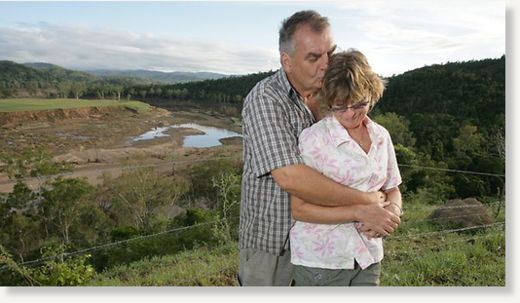
It is a big ask. But Mr Craigie felt greatly encouraged after sitting through the formal opening of a commission of inquiry into the floods in Brisbane and hearing senior assisting counsel Peter Callaghan SC say that the lessons of the city's deadly 1974 floods had been ignored and this must not happen again.
"People in our communities of Pine Mountain, Fernvale and Lowood live closest to Wivenhoe Dam and suffered very badly in the floods," Mr Craigie, 54, told The Australian as he took notes in a courtroom that will be the inquiry's city arena.
"We want our questions answered and we need to have confidence in (the dam operator) SEQWater. We need reassurance that lessons from the flooding will be properly understood.
"Many have lost so much and, although they are busy trying to piece their lives and livelihoods back together, they, like us, want to know why Wivenhoe was allowed to fill to a level of capacity which ultimately brought into question the integrity of the dam itself.
"People who suffered need an opportunity to not only attend the inquiry and hear what the experts have to say but also to ask pertinent questions."
As the inquiry's head, Supreme Court judge Cate Holmes, said in her opening, "frantic busy-ness" has characterised the low-key work to date of an inquiry that also comprises former police commissioner Jim O'Sullivan and dams expert Phil Cummins.
Justice Holmes spoke of the "simply catastrophic" impact of the flooding, the devastation of wide swaths of Queensland, the tragic deaths, her determination to hold public hearings across the state and the scale of the challenge -- from examining questions over dam management to land-use planning, and dozens of issues in between.
She also spoke of society's limits in planning and protecting against extreme acts of nature and of the inquiry's mandate to identify changes that would give mortals a better chance next time.
Mr Callaghan, who succeeded in an underdog's role two days earlier in a rare private prosecution (of a Queensland police officer who had violently assaulted a homeless and defenceless elderly man), wants those who were flooded and have pertinent observations and recommendations to speak up.
"For those who lived through the worst of it, (the Brisbane flooding of) 1974 provided lessons that were never to be forgotten," he said. "For others, 1974 became a shorthand term which was understood to relate to flooding but which -- with the passage of time -- greatly lost meaning and failed to convey the true sense of loss and destruction . . .
"This commission affords an opportunity to ensure the lessons that must be learned from this occasion are recorded for the future. In this way, it might be hoped that Queenslanders are neither condemned to the fate of those who cannot remember the past, nor left vulnerable at the hands of those who might choose to forget it," Mr Callaghan said.
"Any concerns about political interference can be laid to rest."
Asked to comment on the remark about political interference, Premier Anna Bligh said: "The government established the independent inquiry because we wanted an open, transparent investigation . . . free from the involvement of any side of politics."
For Mr Craigie -- whose knowledge has led him to conclude that the way Wivenhoe Dam was operated contributed to much of the flooding downstream -- the inquiry has started positively and constructively.
"It looks promising. And that's good because our confidence needs to be restored," Mr Craigie said.



Reader Comments
to our Newsletter